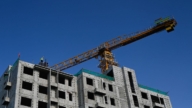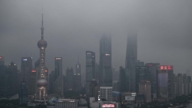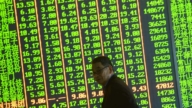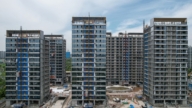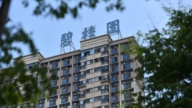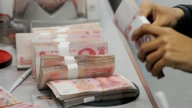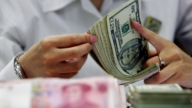【新唐人2012年7月10日訊】近來,中國經濟增速持續放緩,於是大陸央行在一個月內兩次降低利率,力圖刺激發展。但各地方政府藉機為房地產市場鬆綁,房價出現回升跡象。日前國務院總理溫家寶再次強調,決不能讓房價反彈。專家分析指出,大陸房地產問題的根源是中共的政治制度,雖然溫家寶三令五申,但很難奏效。
溫家寶7月7號在江蘇調研時表示,房地產調控仍然處在關鍵時刻,在促進房價合理回歸的同時,決不能讓房價反彈。溫家寶強調,要抑制投機和投資性需求,防止變相放鬆購房政策,對涉及違規騙取購房資格的企業、仲介機構和個人,要嚴肅查處。這是近半年來,溫家寶第5次強調房地產調控和房價的合理回歸。
政治經濟評論家草庵:「中國大陸在目前這個狀況,溫家寶在反覆的談這個問題,是因為中央的命令沒有辦法得到地方(政府)執行。因為在中國,現在完全是一個利益集團在把持這個政府。」
政治經濟評論家草庵同時指出,其實中央也很清楚地方政府的額外收入基本都來自拍賣土地,如果真正打壓過高的房價,地方政府就沒辦法維持。
草庵:「中國(中共)政府解決房地產的問題,必須要進行政治上的改革、體制上的改革。首先是稅制上的改革,如果說中國政府不談稅制的改革,不抑制腐敗、不進行公眾監督的話,中央政府所有的調控都沒辦法執行下去。」
中國問題學家鞏勝利也對《新唐人》分析了大陸房價居高不下的深層原因。他指出,政府主導的中國經濟模式改變了市場經濟的運行規則,政府既是裁判員,又是運動員,這樣的經濟模式自然矛盾重重,很難運轉下去。
鞏勝利:「(溫家寶)已經沒有辦法使中國房地產再走下來了。因為中國房地產本身就不是市場經濟,所以說,官方用政治、這個一統壟斷的現象來治理這個市場,怎麼可能達到這種效果?」
今年(2012年)5月中旬,溫家寶談到,要把宏觀經濟「穩增長」放在重要位置。緊接著,央行先後在6月8號和7月6號下調人民幣存貸款基準利率,力圖刺激經濟,擺脫持續低迷狀態,實現「穩增長」目標。
但「穩增長」顯然和此前打壓房地產泡沫的調控政策出現矛盾,當局陷入兩難境地。伴隨著央行的連續降息,各地方政府藉機相繼放鬆房市調控限購政策。6月份全中國100個城市新建住宅,平均價格出現環比輕微上漲,結束了連續9個月以來的下跌態勢。民眾擔憂,房地產泡沫將會再度加大,一直居高不下的房價將會再次攀高。
對此,鞏勝利認為,如果房價調控不下來,必然導致中國大陸出現新一輪的通貨膨脹。
草庵則強調,現在中國經濟面臨近30年來最嚴峻的局面,最壞情況已經開始出現。
草庵:「在這點上,實際上國際上跟國內都有一個共識。就是如果中國不進行政改,特別是5年之內不進行徹底的改變的話,整個中國將會亡國。當然他們也提出來,如果中國不改的話,更大的可能是亡黨,中共就會徹底倒臺。」
另據報導,上個星期,有望在中共18大上接替溫家寶出任國務院總理的李克強,也曾發表講話,他強調,要穩定房地產市場調控政策,鞏固調控成果。
採訪/劉惠 編輯/李謙 後製/李若琳
5th Time in 6 Months: Wen Jiabao Talks House Price Control
China’s economic growth has continued to slow down.
Within a month, the mainland central bank twice lowered
interest rates to boost economy.
Local authorities of the Chinese Communist Party
took the opportunity to relax property market restrictions,
and house prices began to show signs of rebounding.
CCP Premier Wen Jiabao recently re-emphasized
a desperate curbing of house price’s upward trend
Experts say, the root of China’s real estate problem is
the CCP’s political establishment.
That can explain why the central control policy could not
be carried through in spite of Wen Jiabao’s repeated orders.
On July 7 on his inspection in Jiangsu Province, Wen Jiabao
said that the stage still remains crucial for real estate control.
Property prices shall in no way be allowed to rebound
while being promoted so as to achieve the goal of reasonable house pricing.
Wen stressed curbing speculation and investment demand,
to avoid disguised loosening up of house purchase policy.
Severe punishment shall be imposed on enterprises,
intermediary institutions and individuals that are implicated in
defrauding the entitlement to purchase properties, said Wen.
This was the 5th time over the recent six months that
Wen has stressed the control and reasonable pricing of China’s property market.
Cao’an (Political & economic commentator): “Wen Jiabao’s
repetitive talk about this issue
is because the central authorities’ policies haven’t been
carried through at the local-level.
Now in China, the government is completely controlled by
interest groups."
Cao’an says the CCP’s central authorities clearly know that
land auction is the main source of local extra-budget revenue.
If Beijing truly puts the pressure on over excessively high
house prices, local authorities will have no way to sustain, he thinks.
Cao’an: “To solve real estate problems, the Chinese
government must carry out political and institutional reforms.
Firstly, reforming of the tax system. Without it,
without curbing corruption, and realization of public scrutiny,
all central control policies can’t possibly get
carried through.”
Expert on China, Gong Shengli, analyzes the underlying
causes of China’s high property prices.
The government-led economic model has changed
the rules of the marketing.
The government became both the referee and the athlete.
Such an economic model is naturally contradictory and
hard to maintain or manage well.
Gong Shengli: “(Wen) has no way to keep China’s
real estate going, as it isn’t a market-based economy.
So how could it be successful when it has used political
monopoly as a way to control the market ? “
In mid-May,Wen Jiabao claimed to prioritize the
“steady growth" of the macro-economy.
Then, the central bank cut its bank reserve ratios in
June and July,
trying to stimulate the economy,
getting rid of a long-term downturn.
However, the goal of “steady growth" is apparently against
the previous policy of suppressing the real estate bubble.
The CCP authorities have stepped into a dilemma.
Along with the central banks interest rates cuts,
local authorities relaxed house purchase restrictions.
In June, the average new residential sale prices in 100 cities
slightly rose month on month, ending the 9-month downward trend.
The public worry that the housing bubble will
keep growing, which will fuel high house prices.
Gong Shengli thinks the failure of housing price control
will trigger a new round of inflation in China.
Cao’an notes that China’s economy faces the most serious
situation in the last 30 years. The worst-case scenario has begun to emerge.
Cao’an: “In this regard, there is a common view held
in China and overseas.
That is, without implementing political reform,
within five years, China will perish.
And more likely, they said, is the collapse of the CCP."
Last week, Li Keqiang, the likely successor to Wen Jiabao
as the CCP’s Premier at the upcoming 18th Congress,
reportedly stressed keeping the real estate
market control stabilized.


